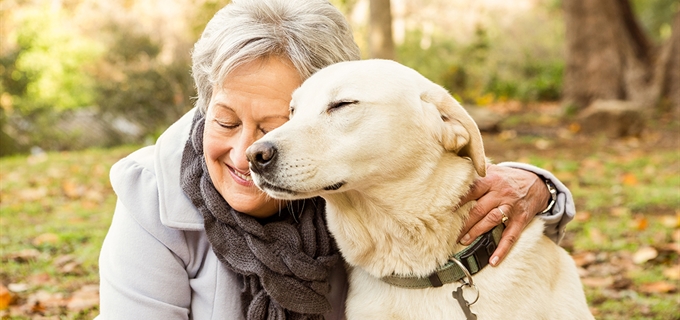Search for a doctor or hospital in your network.


Search for a doctor or hospital in your network.
Delicious recipes, helpful cooking and nutrition tips. Find food preparation videos and "ask the dietitian!"

Get News & Updates Directly To Your Inbox
A furry friend can help:
The simple act of walking your dog several times a day boosts your activity level and adds exercise into your routine. Just as important, it offers a chance to socialize with dog owners and others along the way. A study by the University of St. Andrews ![]() in Scotland reported that dog owners over the age of 65:
in Scotland reported that dog owners over the age of 65:
For one, having a dog or any four-legged animal in the house leads to a greater risk for accidents.
A study by the Centers for Disease Control and Prevention (CDC) found that about 86,000 Americans go to the ER each year due to a fall linked to a pet — mostly dogs.
If you’re thinking about getting a dog or already have a furry companion, here are a few safety tips to help reduce your risk for falls:
Any fall should be taken seriously. Falls in older adults are the number one cause of fractures, hospital admissions and injury-related deaths. See a care provider if you:
Remember to tell your doctor about any fall, and if you felt faint or dizzy before the fall.
Originally published 11/22/2016; Revised 2019, 2021, 2024
Blue Cross and Blue Shield of Montana, a Division of Health Care Service Corporation,
a Mutual Legal Reserve Company, an Independent Licensee of the Blue Cross and Blue Shield Association
© Copyright 2026 Health Care Service Corporation. All Rights Reserved.
Verint is an operating division of Verint Americas, Inc., an independent company that provides and hosts an online community platform for blogging and access to social media for Blue Cross and Blue Shield of Montana.
![]() File is in portable document format (PDF). To view this file, you may need to install a PDF reader program. Most PDF readers are a free download. One option is Adobe® Reader® which has a built-in screen reader. Other Adobe accessibility tools and information can be downloaded at https://www.adobe.com/trust/accessibility.html.
File is in portable document format (PDF). To view this file, you may need to install a PDF reader program. Most PDF readers are a free download. One option is Adobe® Reader® which has a built-in screen reader. Other Adobe accessibility tools and information can be downloaded at https://www.adobe.com/trust/accessibility.html. ![]()
![]() You are leaving this website/app ("site"). This new site may be offered by a vendor or an independent third party. The site may also contain non-Medicare related information. Some sites may require you to agree to their terms of use and privacy policy.
You are leaving this website/app ("site"). This new site may be offered by a vendor or an independent third party. The site may also contain non-Medicare related information. Some sites may require you to agree to their terms of use and privacy policy.
Powered by Verint
Last Updated 10012018
Y0096_WEB_MT_CONNECT19_C